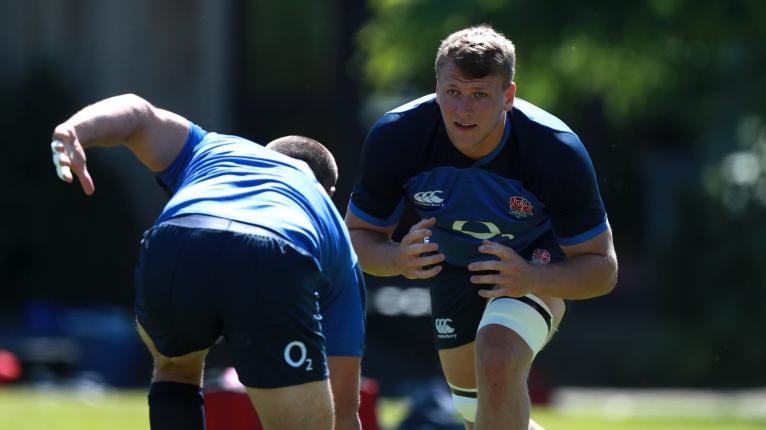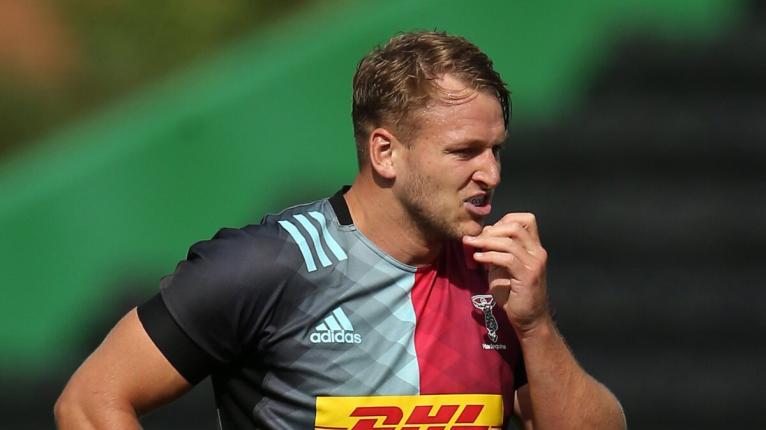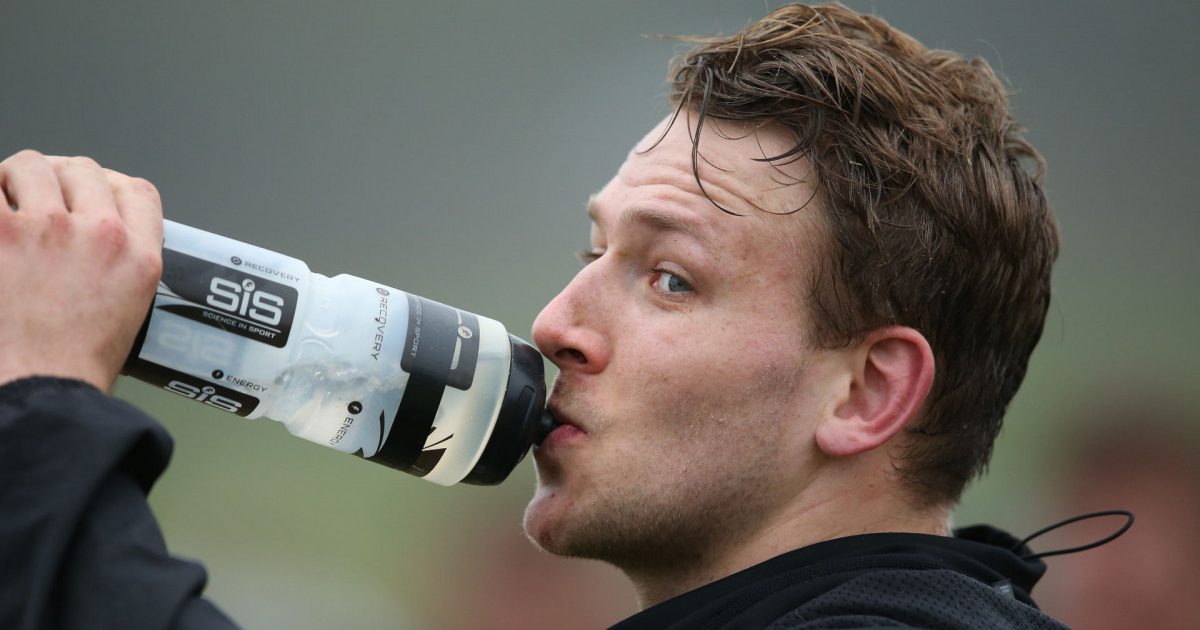'I have got four plates in my jaw that are permanent... unfortunately, you get a minority that takes the law into their own hands and get away with it'

‘The Dominator’ was game to talk last Monday on his day off. Over the course of 25 minutes, Alex Dombrandt sifted through a whole myriad of scrapes and japes with RugbyPass about his journey from south London to becoming a Harlequins regular via a colourful three-year detour in Wales.
On-pitch assaults that twice broke his jaw and left him with four permanent plates inserted. Shedding 10kgs off his university rig after arriving into the pro ranks. His delicate situation on the England fringes. The stars he especially looks up to at The Stoop.
All this and much, much more came up for discussion during a breezy conversation where even his frisky five-month-old French bulldog puppy wound up banished to the next room for being too much of a whimpering distraction midway through.
All was on the table except for one thing: Paul Gustard. Five days after it had emerged that the Harlequins director of rugby who arrived at the club in summer 2018 at the same time as Dombrandt had quit with immediate effect, the No8’s perspective on his former boss was the elephant on the Zoom, the hot topic that the interview-organising go-between stressed in advance was not on the agenda.
The explanation? ‘Gussy’ and his abrupt exit was for others to debate and mull over. “Life goes on and us players have got to step up and start performing better on the pitch and hope to get back to winning ways at the weekend.”
https://twitter.com/Alex_dombrandt/status/1332783042478346241
That was the sole nodding reference Dombrandt made to the goings-on at Harlequins which sees them heading to Wasps this Sunday with general manager Billy Millard installed as caretaker boss of a team that has had its troubles defensively this winter.
Quins not doing well hurts a player who was a fan long before he ever put pen to paper and became part of their back row furniture. There was loads of Crystal Palace watching while growing up, Selhurst Park being on his doorstep, but Dombrandt was also a Big Game regular at Twickenham as well as frequently paying in through the Harlequins turnstiles across the road at The Stoop.
The terrace-to-pitch passage was never starker than in Christmas 2018. He and his family had been in the Twickers stands en masse twelve months earlier, lapping up the festive revelry as Quins gave Saints a hammering. Now, Dombrandt was on the pitch and diving over in the corner for an early Harlequins score as Wasps were beaten in front of 82,000.
“It’s quite nice to look back as a supporter and then a year later as a player. That’s the one that stands out for me,” he enthused, going on to explain how these unprecedented times of behind closed doors games are particularly affecting older brother Ben who had travelled around England and beyond to see his sibling’s career take off and soar.
“It’s affecting him a lot, and it has affected quite a lot of people. Speaking for my brother it was sort of his purpose to get through the week. Something to look forward to at the start of the week, to go and watch the games on the weekend, so not being able to do that, as for all the fans, is tough.”
Dombrandt himself has recently experienced that feeling of getting frozen out. His whirlwind first season catapulted him into an England jersey for the June 2019 win over the Barbarians. However, despite selection in other training camps, he wasn’t a World Cup squad pick, is still uncapped and isn’t in the reckoning for the 2021 Six Nations.
“No, I didn’t get any contact from them,” he admitted when asked if there was an explanation as to why he wasn’t considered having featured in initial October training camps. He’s trying hard, though, not to get stressed about existing in the ‘nearly zone’.
“It’s tough. I’ve had a couple of experiences in training camps. I was in the World Cup training camp and the Autumn Nations just gone as well. My focus is fully with Quins. I really want to do well with Quins, I want to start winning games and in the end, start winning trophies. Perform well with Quins and then whatever will be will be.”

He’ll look the part if and when that does eventually happen. Gustard described Dombrandt as having a ‘university rig’ when he pitched up in Guildford for Harlequins pre-season in 2018 straight from student rugby. His 127kg physique is now down to 117/118kgs and the difference is tangible.
“At the start, I managed to lose quite a bit and then I guess from there it has been a gradual sort of thing. Coming from university I was quite heavy and realised soon that in a professional game I needed to shed a bit of weight just so I could be more involved in the game and have those involvements on both sides of the ball.

“That definitely helped. The professional game is fast, it’s physical, so I needed to be able to acclimatise my body to make sure I could perform well. We get loads of stats on our game and one they look at is how quickly once you have made a tackle that you get off the floor and get back into position ready for the next phase.
“From the start of my career until now that has definitely improved, that’s just an example, the speed at which you are able to make a tackle or make a carry and then get off the floor and get back in the game… the uni lifestyle definitely helps you put on a bit of weight.
“University is a high standard but you definitely have those late-night treats. Coming into a professional environment it’s probably a wake-up call in terms of how it affects you and the slight changes I needed to make in order to have a good crack at the game.
? Who remembers when this guy would score tries for fun?
? @Alex_dombrandt #TryOfTheDay #COYQ pic.twitter.com/5IEuFAT45V
— Harlequins ? (@Harlequins) May 13, 2020
“You can still have your treats here and there but just make sure on the whole that you have a fairly good diet, it’s quite important. I still have all of my treats, for sure, don’t get me wrong. It’s just every so often now instead of where they were a regular occurrence before. I like my crisps and nuts and I’m a big fan of a takeaway. Any pizza or curry, that’s probably my go-to.”
Those hard foods were a no-go, though, during two traumatic periods of Dombrandt’s time at university. Playing for Cardiff Met in the Welsh leagues, he was assaulted and twice had his jaw broken playing against the same opposition, brutal incidents that had court sequels with a conviction and a jail sentence for one perpetrator.
The second break especially hit Dombrandt hard. He even contemplated quitting playing but a compromise was reached – he would only play in the university championship matches, games that had three officials and videos in use compared to just a referee in the Welsh grassroots.
“I’ve had a couple of incidents where I broke my jaw and had to have surgery both times,” he reflected sombrely. “I have got four plates in my jaw that are permanent. Like with any sort of serious injury you always think this is a bit too much, especially when you get the same injury twice and the manner of which it happened it got me really down in the dumps.
View this post on Instagram
“They were like ten weeks out each but it was the manner of the injuries. With a broken jaw, I couldn’t eat solid foods for four, five weeks. I had to have constant check-ups. The second time it got infected, all of those sorts of issues. That is the bit which is the tough part.
“I’m not sure how much you know about the Welsh championship but it’s definitely a different style of rugby. Look, it was two incidents that should never have happened on a rugby pitch and rarely happens on a rugby pitch.
“But unfortunately you get a minority of people, especially at that level where you have a referee but no touch judges, they’re from the clubs, they are coaches running a line. Unfortunately, you get a minority that takes the law into their own hands and unfortunately they get away with it.
“The second time coming back I had a sit-down with my coaches and we decided I wouldn’t play in the Welsh championship against the other Welsh teams, that I would just play the BUCS university stuff where you have linesmen and there’s cameras and all that. So coming back the second time there weren’t any issues.
View this post on Instagram
“All of the guys at Cardiff Met were really supportive. They helped me with all of my lectures, making sure I was staying on top of all my work while I was away from university and making sure I was okay and mentally alright. They were really helpful, really good through it all. I got back playing, started loving rugby again and never looked back.”
Coming into the Gallagher Premiership at Harlequins via the universities rugby route was unusual given the dominant academy structure but it’s something Dombrandt would like to see happen more. While at college he still got to play age-grade Six Nations, had to learn how to fend for himself, while it also meant he came into pro rugby with a sport and physical exercise degree already in his back pocket.
“Going to university you develop that responsibility in having to fend for yourself. You don’t have your parents doing all your washing and cooking. You definitely learn a few life lessons,” he said, adding: “Three months of Wales U20s, that I loved. I felt like I was welcome there as good as I would be welcomed anywhere and I still keep in contact with quite a few of the boys now.
“Coming from a university background is quite unique in itself. It’s not really seen that much these days. The main thing I wanted to ensure at Harlequins was I got signed from a university for a reason. They obviously liked what they saw in terms of what I was doing at university, so it was just sticking to what I was good at, sticking to the way I played at university and trying not to be someone that I wasn’t.
View this post on Instagram
“At the end of the day, they signed me because they liked what they liked at university. I tried to just stay as similar to that as possible. You will see more and more people come through the university programme. If you can leave university with a degree and a professional contract at the end of it it’s great. You have a professional contract and then for whenever your career finishes you have a degree you can fall back on. It should be encouraged more.”
Now contracted at Harlequins through to summer 2022, the 23-year-old Dombrandt is set for his 60th appearance when they visit Wasps. He will take his place in the Ricoh Arena dressing room, focus in on his pre-match tunes and take pride in reaching a milestone that was a distant thought when he first walked in through the doors at the club where he was soon smitten with the influence of two legends, Chris Robshaw and Mike Brown.
“I’m very chilled, listening to my own music, very chilled music, nothing too boom-boom that some of the young kids listen to. Very chilled, just try to stay as calm as possible and think what I want to impose on the game,” he said, explaining his usual pre-game routine before turning to the now-departed Robshaw and the still-going-strong Brown.
“Chris Robshaw epitomises what it is to be a professional rugby player and Mike Brown as well, especially those two. You look at how professional they are in the environment and how they go about their business. Just the way they train, the way they look after themselves, how they recover. Two standout people. Mike was one of the first people to come up to me and say hi and was always there for advice, I look at him as a real good friend now.”
* Alex Dombrandt was speaking on behalf of Gallagher’s Tackling Tomorrow. Together campaign which utilises its position as title partner of Premiership Rugby to help support local businesses during the pandemic. Find out more here: ajg.com/tackling-tomorrow-together
"You can definitely sense it's a lot quieter and businesses are struggling"
– Alex Dombrandt is playing his part for @Harlequins in Tackling Tomorrow. Together, a @GallagherUK @premrugby
initiative supporting local businesses #TacklingTomorrowTogetherhttps://t.co/czqB8jbghR— RugbyPass (@RugbyPass) January 29, 2021











































